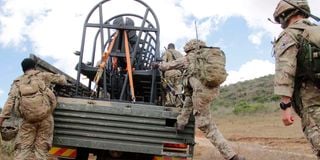Premium
Why Kenya can’t prosecute killer British soldiers yet

British Army soldiers board a military truck after a battle group exercise at Lolldaiga training area in Laikipia County on November 14, 2022.
Kenya will have to wait longer to get the express authority to prosecute British soldiers who commit murder crimes in the country.
Despite the National Assembly giving a nod to the renewal of the Defence Cooperation Agreement (DCA) between Nairobi and London on Thursday, the sticky question of whether Kenya will have powers to try British soldiers suspected to have killed people while in the country remains unresolved.
Mr Nelson Koech, the chairman of the Defence and Foreign Relations Committee, told the Sunday Nation that Kenya’s Executive has to negotiate with its UK counterpart on the implementation of the agreement and the reservations MPs noted when they passed it.
Read: Lolldaiga fire: Lawyers for UK soldiers urge court to throw out case, claim sovereign immunity
“On Kenyan prosecuting, at the moment if there is a murder suspect among British soldiers, this has to await renegotiation between the two parties. Kenya can’t do it unilaterally,” Mr Koech said.
MPs passed the cooperation agreement but had reservations. One was that British soldiers training in the country, who commit murder crimes be tried locally. The committee pointed out that Article 6 (5) of the cooperation agreement should be amended in order to include murder as one of the offences under the jurisdiction of the host country.
Currently, Article 6 of the agreement subjects the visiting forces to the laws of the host nation. However, it grants authorities of the visiting forces primary jurisdiction to try offences arising out of official duty.
The committee also recommended the addition of a clause compelling the British Army Training Unit (Batuk) to do more community work.
However, these two recommendations will not take effect as the UK House of Commons had passed its side of the cooperation agreement in 2021. The two items by Kenyan MPs were not in that document.
Since the contract had already been signed by defence ministries in Kenya and the UK, last week’s ratification by the Kenyan Parliament automatically triggered the contract into effect. So, the reservations bear no weight for now.
Community lawyer Kelvin Kubai, while opposing the ratification, said that the Parliamentary reservations on the pact could not be considered since the UK Parliament had already ratified the treaty.
“Such amendments can only be made during drafting but not ratification. The recommendations will only be considered after five years during the pact’s renewal,” he said.
Mr Koech explained that there are no documents in existence, only that the Kenyan Parliament approved the ratification of the agreement with two reservations — which is provided for in the ratification Act.
“The implication is that the agreement as approved by the National Assembly applies except for the two articles where the House expressed reservations,” Mr Koech said.
However, Rarieda MP Otiende Amollo said Kenya can still prosecute the British soldiers locally, saying all bilateral agreements are subject to the laws of the host country.
“The idea that we have people in our country who are protected by our laws but cannot be tried for the same laws is a misnomer. Once they are in our country, then our laws apply. The Kenyan Parliament did well to pass the report. This ought to have been done ages ago,” Dr Amollo said.
The ratification of the agreement has however been criticised as pertinent issues raised by residents of Laikipia were resolved and also for the lack of public participation.
According to Laikipia County Assembly Speaker Lintano Nabaala, murder, though a criminal offence, is not regularly committed.
“I wish that the National Assembly would have discussed the pertinent issues facing the community and the foreign soldiers daily like the use of prohibited drugs and how to go about the compensation claims,” he said.
Laikipia County lawyer Alex Muchemi faulted the ratification of the DCA, noting that the public has not been sensitised on the existence of the pact, its content, rights and responsibilities as per the agreement.
“There has always been a poor implementation of the pact, and the problems we have been facing will continue if the concerns raised by the public are not considered,” he said.
Some Laikipia residents have accused the Defence and Foreign Relations Committee of failing to address their concerns before ratifying the agreement. They said the committee failed to carry out public participation with the community as earlier promised.
Reporting by Samwel Owino, Nicholas Komu and Mercy Mwende





